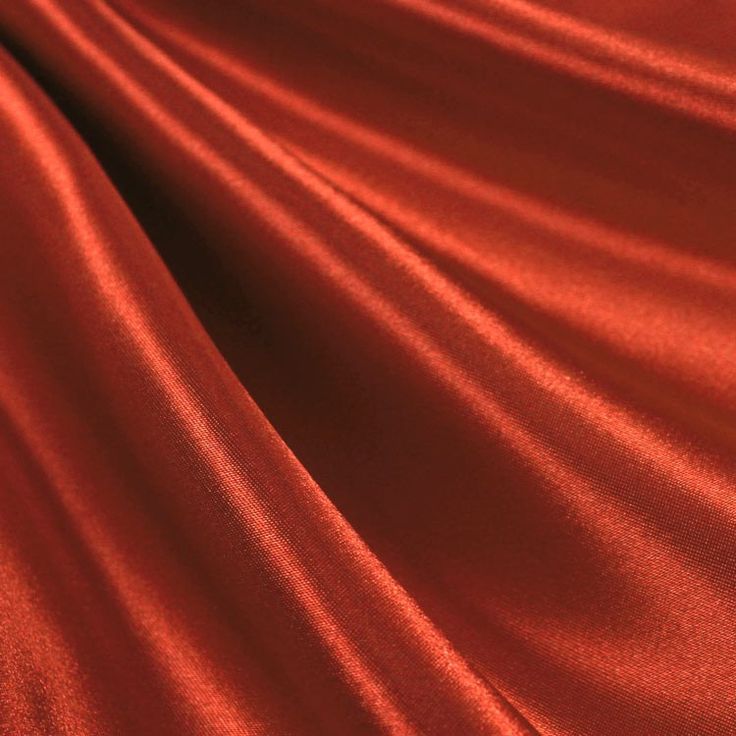Introduction
In a world increasingly conscious of environmental impacts and ethical sourcing, eco-friendly fashion is not just a trend; it’s a movement. Within this realm, the emergence of rust-colored dresses as a staple in sustainable wardrobes is both a nod to the earth from which we draw our resources and a statement of style. This article delves into why embracing rust-colored dresses in eco-friendly fashion is more than just a choice of color—it’s a commitment to our planet and a celebration of nature-inspired aesthetics.
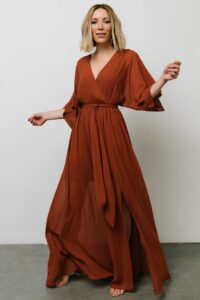
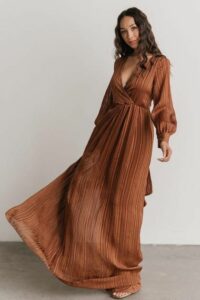
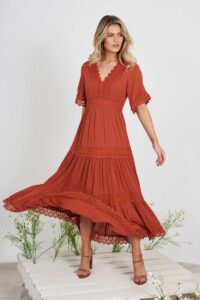
The Rust Color: A Symbol of Earth and Sustainability
Rust, a rich, deep hue reminiscent of autumn leaves and sunset terrains, holds a special place in the eco-fashion palette. This color is often derived from natural dyes, which are key components in sustainable fashion. Made from organic materials like plants, minerals, and even certain types of soil, these dyes offer a safe and environmentally-friendly alternative to synthetic dyes, which are notorious for their toxic impact on waterways and ecosystems. The rust color, with its warm, earthy tones, symbolizes a return to these natural roots.

Sustainable Fabrics: The Canvas for Rust Dresses
The choice of fabric is crucial in the making of eco-friendly rust dresses. Materials such as organic cotton, hemp, bamboo, and recycled fabrics are at the forefront of sustainable fashion. These fabrics are not only renewable but also biodegradable, minimizing the ecological footprint. They are often grown or produced without the use of harmful pesticides and chemicals, ensuring a cleaner and safer production process. When dyed with natural rust hues, these fabrics retain their eco-friendly qualities while gaining an aesthetic appeal that is both raw and refined.
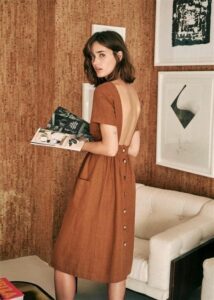
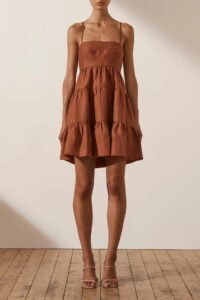
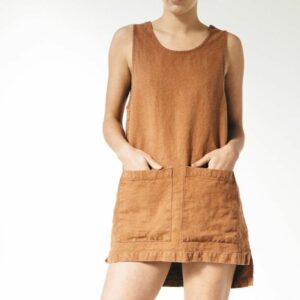
Ethical Production: Behind the Scenes of Making Rust Dresses
Sustainable fashion is not just about the materials used; it’s also about how they’re transformed into garments. Ethical production practices are integral to this process. This includes fair labor practices, safe working conditions, and adequate wages for the artisans and workers involved in making rust-colored dresses. Many eco-fashion brands are committed to transparency in their production chain, ensuring that each garment, imbued with the beauty of rust, is also a testament to fair and humane manufacturing.
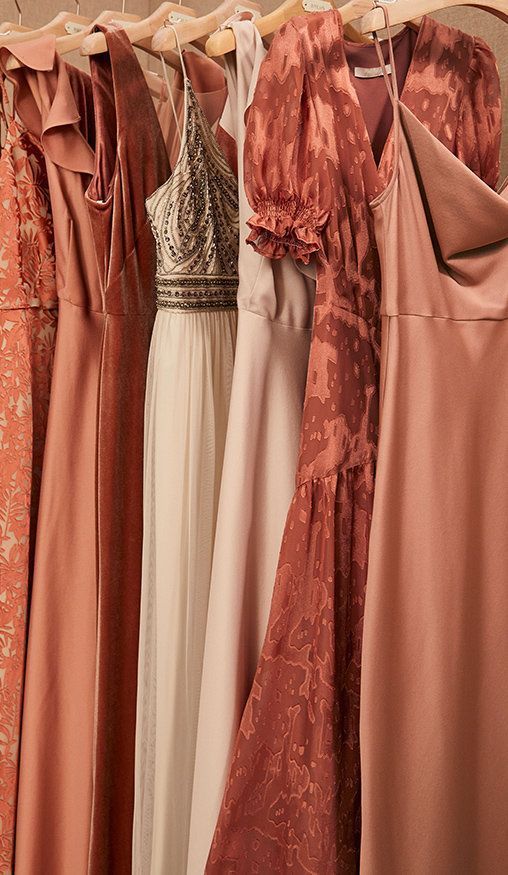
Styling Rust Dresses: Timeless Elegance Meets Earth-Conscious Fashion
The versatility of the rust color makes these dresses a coveted item for various occasions. Whether it’s a casual day out, a formal event, or a professional setting, a rust dress can be styled to fit the bill. Pairing it with accessories made from sustainable materials like wooden jewelry, vegan leather bags, or shoes made from recycled materials can enhance the eco-friendly aspect of the outfit. The rust dress stands out for its ability to blend seamlessly into different styles while maintaining its unique charm.
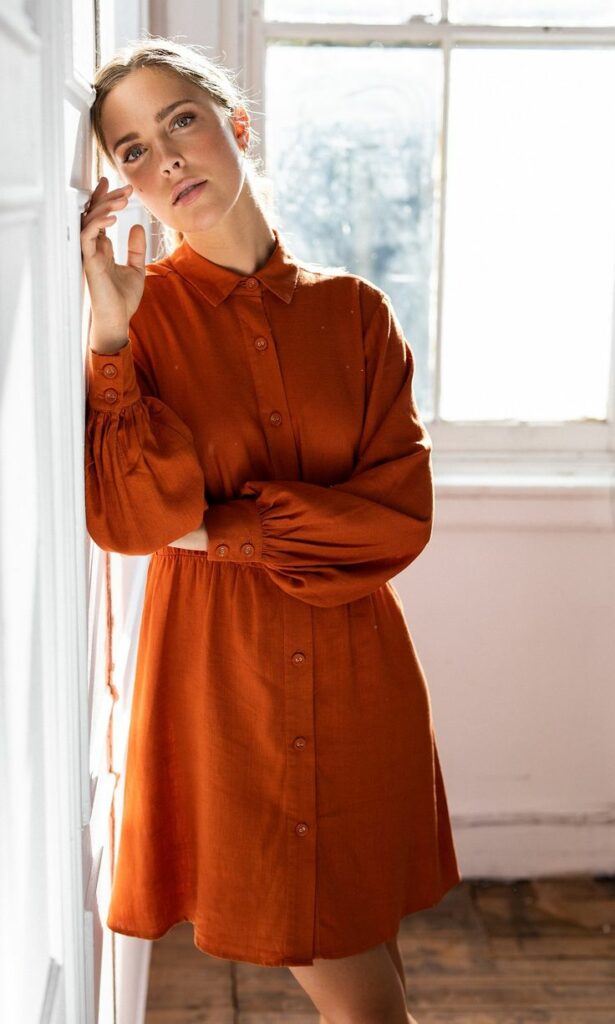
Layering and Longevity: Making the Most of Your Rust Dress
One of the principles of sustainable fashion is longevity – buying less and wearing more. A rust-colored dress can be a versatile piece in a capsule wardrobe, easily layered and adapted to different seasons and trends. In cooler weather, it can be paired with eco-friendly cardigans or jackets. For a summer look, it can stand alone or be accessorized with light, natural fabric scarves. This adaptability makes the rust dress a long-term investment in both style and sustainability.
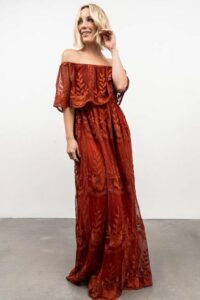
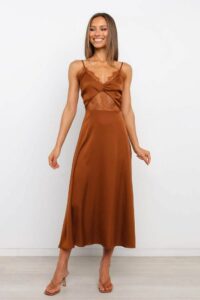
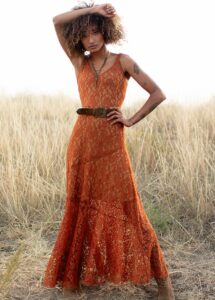
The Environmental Impact: Beyond the Wardrobe
The impact of choosing a rust-colored dress extends beyond personal style. By opting for eco-friendly fashion, consumers contribute to a larger movement that addresses some of the most pressing environmental issues. The production of sustainable garments uses less water, reduces carbon footprints, and minimizes waste. By embracing rust in their wardrobe, consumers make a statement about their commitment to preserving the planet.
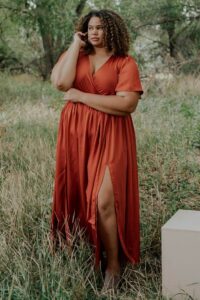
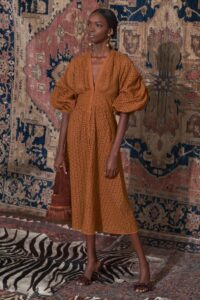
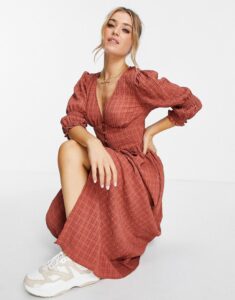
Challenges and Opportunities in Eco-Friendly Fashion
While the shift towards sustainable fashion is promising, challenges remain. The higher cost of eco-friendly materials and ethical production practices can make these garments more expensive than their fast-fashion counterparts. However, this also presents an opportunity for consumers to reconsider their buying habits, prioritizing quality and ethics over quantity and convenience. As demand for sustainable fashion grows, it has the potential to become more accessible and affordable.
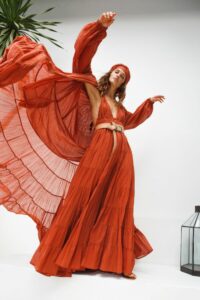
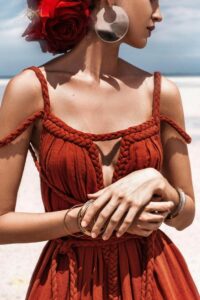

Conclusion
The rust-colored dress in eco-friendly fashion is a symbol of a shifting paradigm – one that values the health of our planet as much as it does style. It represents a conscious choice to support environmentally responsible practices, ethical production, and sustainable living. This color, with its deep connection to the earth, serves as a reminder of the beauty that can be achieved when fashion and sustainability go hand in hand. As more people embrace rust in their sustainable wardrobes, they contribute to a brighter, more conscious future – one where fashion is not at odds with the environment, but in harmony with it.
How to Use Orange Aesthetic in Your Design
10 Inspiring Yellow Aesthetic Ideas for a Bright and Cheery Look
The Meaning of Green in Aesthetics and Design

